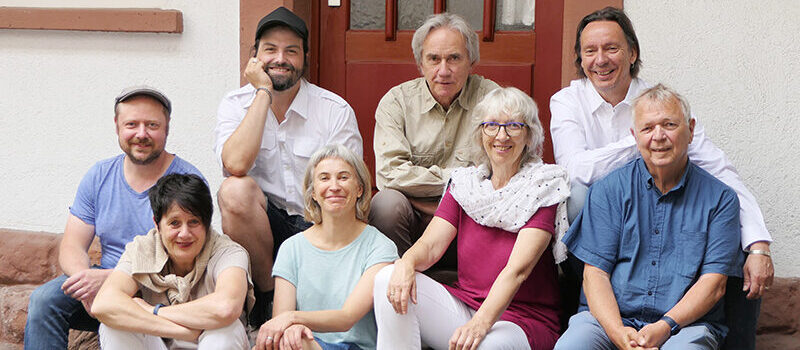Das Chawwerusch Theater — a short outline
The name Chawwerusch originated in the thieves’ argot, a secret language that has been spoken and used in former times by the travelling people. Chawrusse respectively chawerusche derives from chawer (comrade, buddy, friend, accomplice, member of the gang, also see the Hebrew word chawwer) and bears the meaning of gang. The Palatine “Kafruse” contains of the same radical and stands for a gang of cocky kids.
“The premiere, frenetically acclaimed by an enthusiastic audience, did not leave the slightest doubt that the theater gentry originated and rooted in the Southern Palatinate will, yet again this year, set the cultural standards far beyond this very region.” (Sonntag aktuell)
“Dazed and stunned the audience emerges from the end of the story, willing to follow the play for yet a longer time. Back to reality rapturous applause erupts, remuneration for an intoxicating evening.” (Schwetzinger Zeitung)
Chawwerusch is a colorful mélange of theater gentry (Danilo Fioriti, Felix S. Felix, Miriam Grimm, Monika Kleebauer, Ben Hergl, Thomas Kölsch, Walter Menzlaw and Stephan Wriecz) who mutually developed a unique, non-reversible form of theater work. A narration from people for people, put to the scene in a likewise sophisticated as well as entertaining manner: tragic — comic — hearty
Content and program result from the examination of every day life, politics and society. The scrutiny is yet critical, however, always accompanied by a pinch of salt, so to speak, drawing the focus onto the essentials. Taking a close view to the “Nation’s idle talk” and playing to the gallery, literally into the limelight, all issues in a very pointed and straight-forward manner, that is what the Chawwerusch way of theater work is all about. In doing so, the sit-com-like, the human-tragic and hearty aspects are being put into the main focus. Chawwerusch has always truly stuck with their own ideals of being a free theater and thus representing a venue of self-realization and political actuation.
Since 1984, the foundation of the theater, intensive research is the solid basis for most of the plays: traces are being searched and secured, sources studied, stories collected and the line is constantly being drawn up-to-date , sociopolitical issues and human problems. Based on this as well as on imaginary material Chawwerusch creates the plays by free improvisations and creative writing of the script. Then the artistic transfer onto the stage takes place. Teamwork plays an important role, because a crucial part in Chawwerusch’s philosophy is the fact that the creative potential of the entire group can leave its mark on a production.
From September until May people surge to the venue of the Southern Palatine Chawwerusch Theater from the entire region ranging from Weißenburg to Mannheim, from Karlsruhe up to Kaiserslautern in order to view the current production of the theater company. Since 1993 Chawwerusch offers regular theater bills of fare in the venue of the theater hall, the village’s former ballroom hall.
The Chawwerusch Theater is an inherent part of the cultural environment of the Palatinate . For one this is proven by an intensive cooperation with people from the area interested in history and theater and it is founded in the collaboration and encounter with other artists, stage directors as well as in co-productions with other theater companies. On the other hand, for many years Chawwerusch is involved in the promotion of the next creative generation. Various theater plays have been produced together with theater classes of schools and special theater days have been organized and carried out for young people.
The productions are focussed on the regional references and the dealing with the various expression possibilities of dialects play an important role. Additional indicators with respect to Chawwerusch productions is the use of only few, mostly simple but extremely alterable props, by which scene by scene always new images are being created and portrayed. For the most part the actors and actresses themselves easily change the stage environment with a few hand movements and who create new rooms and dimensions especially by their performance. This (versatility-adaptability-flexibility) also applies for the costumes. For the most part the music will be individually composed for a specific production and performed and sung live by the actresses and actors. Along with movements and, of course, language, music is a central means of expression in Chawwerusch staging.
In addition to that a large number of the altogether 150 productions take place outside of Herxheim: every year in the summer there is a tour with open-air performances, and in springtime and autumn as well the Chawwerusch troupe pack their bags on a regular basis in order to perform outwards.
Chawwerusch started out in 1984 with a temporary migrant theater project. Back then their paths lead them through the ” Forest of Odes ” region and the success was that immense, that the entire project was prolonged for another year. Even as early as 1985 the theater hall at Herxheim has been rented for rehearsal purposes, even though the troupe in the beginning was still based at Darmstadt.
Tangible plans were made for a permanent theater and last but not least Chawwerusch has “put down roots” in Herxheim.
The members of the theater company act as writers, stage directors and composers. Many amongst them completed a theater pedagogical education. Thus Chawwerusch closely cooperates with companies of amateur actors, organizes extensive projects and takes care on script writing as well as stage directing.
Chawwerusch is a member of the Landesverband professioneller freier Theater in Rheinland-Pfalz (laprofth) — the National Association of Professional Free Theaters in the Rhineland-Palatinate.
“And when the Chawwerusch Theater asks once more for your presence next year, and this is already certain, yet again yonder magic carpet of imagination will subside onto the plaza.” (Schwetzinger Zeitung)
Translation: Michaela Flick and Phil Johnson, thank you!

